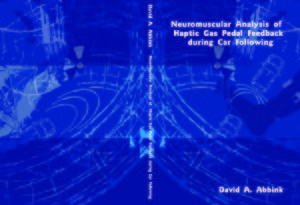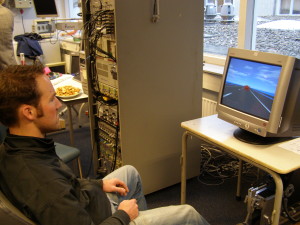Neuromuscular Analysis of a Haptic Gas Pedal for Car Following
Lead: David Abbink2002-2006 (PhD Project, Completed)
Abstract
David Abbink worked together with Mark Mulder towards a PhD thesis on the “Magic Bumper” project, sponsored by Nissan Motor Company. The goal was to develop a haptic gas pedal, as an alternative to ACC.David successfully defended this thesis in dec 2006, and a few months later received the award for best PhD thesis by the VvBN (Movement Sciences in the Netherlands). The work of Mark and David contributed to the market release of the haptic gas pedal by Nissan on USA and Japanese markets, called DCA (deceleration control assist).
“The research described in this thesis has culminated in a thorough analysis of the effect of haptic feedback on neuromuscular properties and its implications for car-following with a haptic DSS. The analysis contributed to the design of a prototype, its experimental validation in a driving simulator, and a parameterized detailed driver model that captures the impact of the DSS on visual and spinal contributions to car-following control.
The conclusions can be summarized as follows: the developed DSS provides drivers with an additional fast haptic feedback loop that allows useful control behaviour at a spinal level, thereby reducing the need to respond to all changes in separation through visual feedback. As a consequence, the DSS allows drivers to realize the same (or an even better) car-following performance with reduced control effort, and is informative enough to replace visual feedback for short periods.”
Status:
Completed
Associated Research Programme:
Supervisors:
Involved Researchers:
Awards
- Best Dutch PhD thesis 2006 in the area of movement sciences

